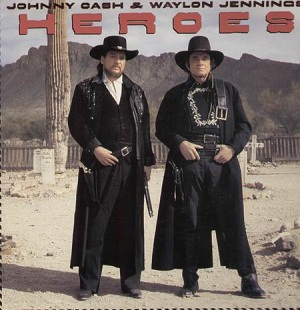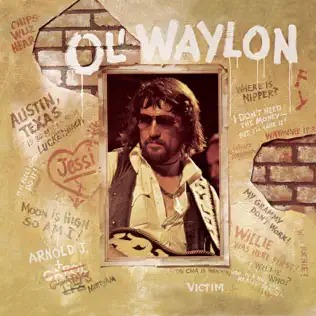
Waylon Arnold Jennings was an American singer, songwriter, musician, and actor. He is considered one of the pioneers of the outlaw movement in country music.
Outlaw country is a subgenre of American country music created by a small group of iconoclastic artists active in the 1970s and early 1980s, known collectively as the outlaw movement, who fought for and won their creative freedom outside of the Nashville establishment that dictated the sound of most country music of the era. Willie Nelson, Waylon Jennings, Johnny Cash, Kris Kristofferson, and David Allan Coe were among the movement's most commercially successful members.
Lincoln Wayne "Chips" Moman was an American record producer, guitarist, and songwriter. He is known for working in R&B, pop music and country music, operating American Sound Studios and producing hit albums like Elvis Presley's 1969 From Elvis in Memphis and the 1985 debut album for The Highwaymen. Moman won a Grammy Award for co-writing "(Hey Won't You Play) Another Somebody Done Somebody Wrong Song", a 1975 hit for B.J. Thomas.

Mirriam Rebecca Joan Johnson, known professionally as Jessi Colter, is an American country singer who is best known for her collaborations with her husband, country musician Waylon Jennings, and for her 1975 crossover hit "I'm Not Lisa".

Highwayman is the first studio album released by country supergroup The Highwaymen, comprising Kris Kristofferson, Johnny Cash, Waylon Jennings and Willie Nelson. Highwayman, released through Columbia Records in 1985, was the group's first and most successful album.

Heroes is a duet studio by American country music singers Johnny Cash and Waylon Jennings, released on Columbia Records in 1986.

Lonesome, On'ry and Mean is a studio album by American country music artist Waylon Jennings, released on RCA Victor in 1973. It was, after Good Hearted Woman and Ladies Love Outlaws, the third in a series of albums which were to establish Jennings as one of the most prominent representatives of the outlaw country movement. Photographer Mick Rock shot the album's cover.

Honky Tonk Heroes is a country music album by Waylon Jennings, released in 1973 on RCA Victor. With the exception of the final track on the album, "We Had It All", all of the songs on the album were written or co-written by Billy Joe Shaver. The album is considered an important piece in the development of the outlaw sub-genre in country music as it revived the honky tonk music of Nashville and added elements of rock and roll to it.

This Time is a studio album by American country music artist Waylon Jennings, released on RCA Victor in 1974, at the peak of the outlaw country movement. It was produced by Jennings and Willie Nelson.

Dreaming My Dreams is the twenty-second studio album by American country music artist Waylon Jennings. The album was co-produced with Jack Clement and recorded at Glaser Sound Studio in Nashville, Tennessee, between February and July 1974.

Wanted! The Outlaws is a compilation album by Waylon Jennings, Willie Nelson, Jessi Colter, and Tompall Glaser, released by RCA Records in 1976. The album consists of previously released material with four new songs. Released to capitalize on the new outlaw country movement, Wanted! The Outlaws earned its place in music history by becoming the first country album to be platinum-certified, reaching sales of one million.

Waylon & Willie is a duet studio album by American singers Waylon Jennings and Willie Nelson, released by RCA Records in 1978. In the US, it stayed at #1 album on the country album charts for ten weeks and would spend a total of 126 weeks on the country charts.

WWII is a duet album by Waylon Jennings and Willie Nelson, released on RCA Victor in 1982.

Ol' Waylon is a studio album by American country music artist Waylon Jennings, released on RCA Victor in 1977. It eventually became one of Jennings' highest-selling albums, due in no small part to the phenomenal success of the chart-topping "Luckenbach, Texas ." It was also the singer's fourth solo album in a row to reach the top of the country charts, remaining there for thirteen weeks and becoming country music's first platinum album by any single solo artist.

I've Always Been Crazy is a studio album by American country music artist Waylon Jennings, released on RCA Victor in 1978.

What Goes Around Comes Around is a studio album by American country music artist Waylon Jennings, released on RCA Victor in 1979.

Black on Black is a studio album by American country music artist Waylon Jennings, released on RCA Victor in 1982.

Nashville Rebel is a box set by Waylon Jennings, released on RCA Nashville through Legacy Recordings in 2006. According to Allmusic's Stephen Thomas Erlewine, it is "the first comprehensive, multi-label Waylon Jennings retrospective ever assembled," comprising ninety-two songs recorded between 1958 and 1994, with selections from the majority of the singer's recording career. The first track of the box set is the Buddy Holly-produced "Jole Blon," released in 1958, while the last is "I Do Believe," a song produced by Don Was that was included on The Highwaymen's 1995 release, The Road Goes on Forever. The other material on the box set covers Jennings' career chronologically, with songs ranging from his years on RCA's roster to later compositions from his short-lived stay at Epic Records; it ignores, however, the tracks from Jennings albums released on independent labels. The majority of the singer's charting singles are included in the package, as are collaborations such as "Mamas Don't Let Your Babies Grow Up to Be Cowboys" with Willie Nelson and "Highwayman" with The Highwaymen. A notable addition is the previously unreleased "The Greatest Cowboy of Them All," a 1978 duet with Johnny Cash which was later recorded by Cash alone for A Believer Sings the Truth (1979) and The Mystery of Life (1991); two others, "It's Sure Been Fun" and "People in Dallas Got Hair," had never been released in the United States. Nashville Rebel was released on four CDs, with a 140-page booklet and liner notes by Rich Kienzle and Lenny Kaye.

The Waylors, later Waymore's Outlaws, is a country music band, best known as the backing and recording band of country music singer Waylon Jennings. Jennings formed the band in 1961, consisting of Jerry Gropp on the guitar and Richie Albright on the drums after moving to Phoenix, Arizona. The band earned a local fan base during its appearances on the night club JD's.
"Don't You Think This Outlaw Bit's Done Got Out of Hand" is a song written and recorded by American country music artist Waylon Jennings. It first released in October 1978 as the second single from his album I've Always Been Crazy. The song peaked at number 5 on the Billboard Hot Country Singles chart. It also reached number 1 on the RPM Country Tracks chart in Canada. Waylon redid the song specifically as well as several others in a session in the mid-1990s in a much slower and more regretful tone towards his previous actions dubbing it 'Outlaw Shit' and it would be released on the 2008 album Waylon Forever, Waylon's first posthumous studio album release.

















